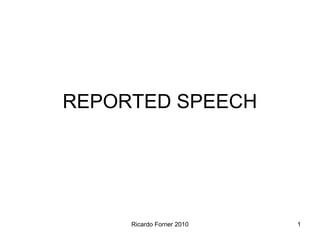
Reported Speech
- 1. REPORTED SPEECH Ricardo Forner 2010 1
- 2. REPORTED STATEMENTS. There are no changes in the verbal tenses when the introductory verb (says, tells, comments, asks, orders..) is in the present tense: - “My brother studies German.” He says (that) his brother studies German. -“I can hear a bird now.” -He says (that) he can hear a bird now. However, when the introductory verb is in the past tense ( said, said to me, told me, asked, commented, suggested, ordered…) there are some changes in the verbal tenses as well as in personal pronouns, possessive adjectives, demonstrative and adverbial expressions of time. All these Ricardo Forner 2010 changes are pretty much the same as those in Spanish. 2
- 3. -“We see you every day” - They said/ said to us/ told us (that) they saw us every day.” - “I danced with you yesterday” - He said (that) he had danced with me the day before/ the previous day. -“He will come tomorrow if he’s free” - She told me he would come the following day /the day after if he was free. - “I’m reading my favourite book” - He commented (that) he was reading his favourite book. Ricardo Forner 2010 3
- 4. -“We were cooking last night.” - They said they had been cooking the night before/ the previous night. -“He has already worked here” -She told us he had already worked there. - “I have been running for an hour and a half” - He said to me that he had been running for an hour and a half. - “They had already watched that film.” - He told me they had already watched that film. - “My brother had been working in a supermarket.” - She explained her brother had been working in a supermarket. Ricardo Forner 2010 4
- 5. -“I can come today” - He said he could come that day. - “She may be at the party tonight” - They told me (that) she might be at the party that night. - “I must help my father with this job” - He thought (that) he had to help his father with that job - “They have to study a lot at university.” - The teacher told them they had to study a lot at university. Ricardo Forner 2010 5
- 6. REPORTED QUESTION Reported questions become subordinate clauses and the sentence is no longer a question but a statement, therefore there is no inversion of subject and verb, there are no inverted commas and there is no question mark at the end. YES / NO QUESTIONS: -“Do you live next to me?” - He asked if I lived next to him. -Did you see the match a month ago? -He asked if I had seen the match the previous month. Ricardo Forner 2010 6
- 7. -“Have you ever been to Italy?” - He asked me if I had ever been to Italy. - Will your friend come to our party tomorrow?” - They wanted to know if my friend would go to their party the next day. Ricardo Forner 2010 7
- 8. WH- QUESTIONS. -“What is the problem?”-I asked what the problem was. -“Where have you been recently?” - He asked me where I had been recently -“Who were you dancing with last night?” -She asked me who I had been dancing with the previous night. Ricardo Forner 2010 8
- 9. REPORTED ORDERS. We change the imperative to the infinitive and we use introductory verbs like tell, order, demand, warn, threat, shout… -“Please, come with me.” -He told me to come with him -”Speak loudly” - The teacher ordered the student to speak loudly. -“ Don’t touch it.” / “Don’t get any closer to me” - They told him not to touch it. / not to get … Ricardo Forner 2010 9
- 10. REPORTED SUGGESTIONS. -”Let’s go to the cinema tomorrow” -He suggested going to the theatre the next day. -”Why don’t we visit our mother” -He suggested visiting our mother. -“Why don’t you visit your mother?” - He suggested that I visit my mother -You should see a doctor. Ricardo Forner 2010 -He suggested that I see a doctor. 10
